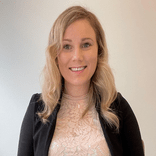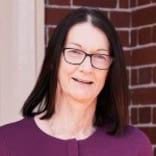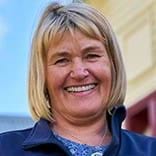Armstrong Creek School's Story: a truly inclusive school community
Evan Savage, Principal of Armstrong Creek School, 2021 Outstanding Inclusive Education and Lindsay Thompson Award for Excellence in Education winner
Armstrong Creek School is one of Victoria’s newest schools, catering for students of all abilities, including a high proportion of learners with disabilities and additional needs.
In establishing the inclusive school community in 2019, the Leadership Team at Armstrong Creek School addressed how best a genuinely inclusive education could be provided, identifying where and what barriers to inclusion were at system and school levels. Principal Evan Savage explains that the team looked at both mainstream and special school settings in an attempt to bring the best of both worlds under the one roof, pioneering a primary and special school designed to operate as one.
‘Anyone that wants to work with us needs to believe that all children can learn, and for that to happen, they must meet each student’s point of need fully and absolutely,” explains Evan. 'Enabling real inclusion involves the deliberate and planned use of all of our resources, maximising our expertise and ensuring our best practice model is underpinned by evidence.’
Placing innovative learning and teaching at the centre of their wellbeing and learning-integrated philosophy, the school is applying the Multi-Tiered Systems of Support Framework (MTSS) to enhance the school’s principled approach to inclusion, ensuring there is well-resourced, structured and specialist support for students at every level of their learning and ability.
Together with a highly adaptable learning environment, the MTSS, School-Wide Positive Behaviour Framework and highly trained and motivated staff, the school has developed a purposeful and widely understood instructional model that is positively impacting upon both learning and wellbeing outcomes for all their students.
Evan says it was a great honour to win the 2021 Outstanding Inclusive Education and Lindsay Thompson Award for Excellence in Education.
‘It was a great recognition of the effort and contribution that everyone in our school community contributes’ says Evan. ‘Winning both awards provides us with many opportunities. The benefit of professional learning for our staff and being able to support all of our staff to build their practice to be able to teach and support all students – even more so than they already are – is where the great value will come in’ said Evan.
Tiffany Thomas: improving student outcomes
Tiffany Thomas, 2021 Outstanding Early Career Primary Teacher Award
Tiffany Thomas, winner of the 2021 Outstanding Early Career Primary Teacher award made a unique start to her teaching career at Melton Primary School.
Arriving mid-lockdown in June 2020, she immediately took on the challenges of remote learning with staff, students and families she had never met.
Tiffany focused firstly on building relations with students, parents and colleagues. Working with empathy and respect for other’s perspectives, her responsive approach to working with students and staff at the school quickly established her as a highly competent and insightful educator.
Tiffany describes her decision to become a teacher as a ‘calling’; first studying Law at university, her experience in the courtroom revealed to her just how important education could be in breaking the cycle between disadvantage and achievement.
'Studying later in life presented challenges, but I knew it was always a passion. I am thankful I stuck at it, as the award win just cemented that I am on the right path. Winning the VEEA award means a lot to me ' says Tiffany.
At the heart of her teaching philosophy is the prioritising of respectful relationships. “I have always been driven to help people, and learnt from my own experience of public education and work experience that if I could be the safe person in the room, it could make a real difference to young people’s lives,” she says.
Determined to shape a different and young-person inclusive approach to teaching both within and outside the classroom, Tiffany is opening student access to learning, and increasing social, emotional and academic support for her Grade 6 students in ways that ensure their voice and perspectives impact positively upon their education.
In a very short period of time, Tiffany has formed an exceptional knowledge of her students and their point of learning. Now an instrumental member of the school’s Framework for Improving Student Outcomes (FISO) 2.0 leadership team, Tiffany is already a high-level contributor to whole-school improvement.
Andrew’s story: a culture of collaboration
In 2020, Andrew McConchie was recognised for his significant contribution to education with not only the Outstanding Secondary Teacher Award, but also the Lindsay Thompson Award for Excellence in Education.
For Andrew, the awards are worthy recognition for the entire school community. Having worked hard to create a culture of collaboration, Andrew believes it is the collective expertise and energy of the people he works with that underpins the success of their students.
Together with colleagues, Andrew worked to deliver a whole-school literacy program that would engage students and their families, with an emphasis on long-term learning outcomes and pathways.
The program connected with parents and carers, while helping to create sudden literacy improvements for many children. Andrew puts this success down to the program’s holistic approach, which emphasises relationships and student wellbeing.
Along with implementing a new literacy program at the school, Andrew has focused on identifying students who need extra support and delivering targeted interventions to improve their learning outcomes.
Andrew believes that effective classroom practices inform young people, develop their critical thinking skills and equalize their opportunities. He encourages students to undertake rigorous learning around ethical, social and cultural issues that link with these capabilities within the Victorian Curriculum.
Andrew’s professional learning grant has enabled him and colleagues to undertake the Berry Street Education Model program and leadership training for middle leaders. The training has helped them to support student voice, boost academic performance and distributed leadership within their teacher group to improve teaching and learning.
Preston High School’s story: engaging high-ability learners
In 2020 Preston High School won the Outstanding Provision for High-Ability Students – Secondary Award. Preston High School’s innovative approach to teaching high-ability learners has achieved outstanding results.
As a relatively new school, Preston High School has taken the opportunity to establish an innovative ‘Learner Growth Approach’ to maximise development-focused learning and inspire students’ engagement with their education. The approach identifies high-ability students early and tailors their learning to their specific developmental needs.
‘There is no single definition of a high-ability student,’ said Principal, Sean Butler.
‘Every high-ability student’s academic profile, history and needs look different. Because of this, our approach to maximising an individual’s learning growth has to be thoughtful and flexible.’
The key to Preston High School’s approach is empowering each student to shape their learning by what fascinates them.
Working with critical elements of the Framework for Improving Student Outcomes (FISO 2.0), the school is aligning its evidence-based approach with the Victorian Teaching and Learning Model (VTLM) so that high-ability students can learn years in advance of their age-group.
The school’s Academic Enhancement Program provides high-ability students access to cross-disciplinary content and courses that supplement the Victorian Curriculum. A wide selection of courses such as Neuroscience, Enhanced Mathematics, Design Thinking and Philosophy encourage high-ability students to produce inspiring output in any number of fields.
‘Our learner growth measures have the potential to increase equity and inclusivity for all students, while raising the bar for our expectation of learning, particularly for our high-ability students,’ Sean explained.
Preston High School has had outstanding success in achieving positive student outcomes. In both NAPLAN and the Student Attitudes to School Surveys, the school is performing well above averages both across the state and for similar schools.
Preston High School’s professional learning grant has enabled all teaching staff to undertake Growing Great Leaders training to empower staff to support high performing students throughout their secondary school journey.
Michelle's story: a chance to celebrate
Following years of her Senior Education Improvement Leader (SEIL) encouraging her to apply for an award, Mordialloc Secondary College principal Michelle Roberts decided 2019 was finally the year.
“After a few light nudges from my colleagues, I decided that it would be great recognition for the school to be involved. My SEIL, Area Director and Regional Director supported my application and it was wonderful to receive such a positive endorsement.”
For Michelle, the award wasn’t only about her contribution, but the school community as a whole.
“It has certainly been a huge honour to win this award. I’ve asked a lot of my community over the past nine years and I’m so proud of my staff and students’ achievements. The award was something that all members of our community could celebrate!”
Michelle intends on using a recent school review to shape how she uses the grant in 2020 and 2021.
She also encourages other schools and their staff to think about the possibilities an award grant can offer a school.
“Winning an award is a fantastic opportunity to be able to go and do something you wouldn’t normally think of doing because of the cost; and its opportunity to share this experience with other members of your team to build their capacity.”
Bruthen Primary School's story: activating student agency
Following their 2018 Outstanding Koorie Education Award win, Bruthen Primary School principal Michelle Young wanted to share the great news with her wider school community.
“Our community was ecstatic to learn of our win and joined us in holding a community celebration evening dinner and of course a community yarn!”
Post celebration it was time to focus on how best to use their grant.
“We wanted to ensure all staff would be able to benefit with professional development and our students.”
A team of five students were also invited to participate in the professional development plan in the role of ‘Student Learning Commissioners’.
“Our aim was to activate student voice and agency, so our Student Learning Commissioners could lead a ‘Learning Inquiry’ which would improve learning outcomes for all their peers.”
Michelle explains how winning the award created new opportunities for her school.
“Winning this award enabled us to access external expertise that we ordinarily would not have been able to afford. We were able to attend conferences in the city and also bring experts in their field to our school.”
“We are extremely grateful for this opportunity and I know we are a better school for it.”
Kerri's story: a journey of learning
Nominated by her Fish Creek Primary School colleagues, Kerri Smith had no real expectation of winning the award – even after being invited to the award night!
“I hadn’t really prepared a speech as I truly wasn’t expecting to have to make one!”
After winning Outstanding Primary Teacher in 2018, Kerri was able to take up a career long goal of extending her knowledge in numeracy all thanks to her awarded grant money.
“Coming from a small school, professional development can sometimes be a luxury to teachers in time and cost. Number-sense for Prep - Year 2 has always an area of interest for me and this grant allowed me to explore this and share my extended knowledge with my students and colleagues.
Kerri’s professional development flourished beyond her grant and award, culminating in her delivering a presentation at the Math Association of Victoria’s annual conference.
“Looking back at the whole process as I delivered multiple sessions on my research to fellow teachers, I was so grateful to my Fish Creek colleagues for seeing something in me. It really is the greatest compliment to know what you are doing in the classroom isn’t going unnoticed by your peers.”
Campbell’s story: reflecting on success
Campbell McKay’s school leadership team at Swan Hill North Primary were surprised by his suggestion to self-nominate for the Outstanding School Advancement Award in 2017.
“My team looked at me strangely when I suggested we nominate. They still look at me strangely but we have now won a Victorian Education Excellence Award, and this has given us a lot of confidence to move forward in a considered direction. We’re a small team here at Swan Hill North, so it would be easy to rule ourselves out. But now we know there are no limits to success.”
Campbell advises other school leaders to invest in the nomination process.
“Don’t hold back, nominate yourself or someone else. The journey of just thinking about what you are doing and why you are doing this is really valuable in itself. That refection about your work and why you or someone else should be considered is justification for putting your hand up.”
Brett's story: sharing the benefit
Following his 2017 Outstanding Business Manager award, Brett wanted to maximise on how he could benefit his whole school community.
“Though the role of Business Manager is separate to the work happening in the classroom, we all have the same goal – to better our students and their outcomes. That’s why it was essential for me to use the grant wisely to support Kurnai College.”
Brett divided his grant into two parts. The first involved engaging literacy expert Dr Carol Christensen to develop and implement the pilot of TR@K (Targeted Reading at Kurnai) – a literacy intervention program.
“It was incredible seeing results happen so quickly, students developing their literacy abilities that will support their learning and lives forever.”
Following the success of TR@K, Brett extended his sights on how he could help beyond his school gates to the wider South-Eastern region.
He decided to share his wealth of knowledge on systems and strategies that improve a school’s financial position – visiting 22 schools across his region. His efforts strengthened the collaborative culture of schools in the region.
“It has been personally and professionally rewarding to have the additional time to help support student outcomes at the local school level and engage with the wider education community.”
Hayley’s story: honouring the work
Hayley Dureau, Outstanding Secondary Teacher Award 2016 winner, reflected recently on her experiences:
“It was a huge honour for my Principal to nominate me for this award. It was a surprise, and at the time I didn’t realise what a big deal it was to be nominated, let alone win it! It made me feel like my Principal and school community recognised and valued the work that I was doing.”
Hayley understands that the time it takes to nominate for an award might be challenging, but she says, “Do it. I know the application might seem overwhelming and if you’re working in a school then you have two million other things on your to-do list… but do it. If you take out the award it could change your life, and if you don’t win, you still get the honour of being nominated and you might even be a finalist and attend the awards night!”
Hayley put the grant towards attending the Harvard Graduate School of Education, presenting at a student voice conference in Vermont and completing a Masters of Instructional Leadership at the University of Melbourne Graduate School of Education.
Updated








